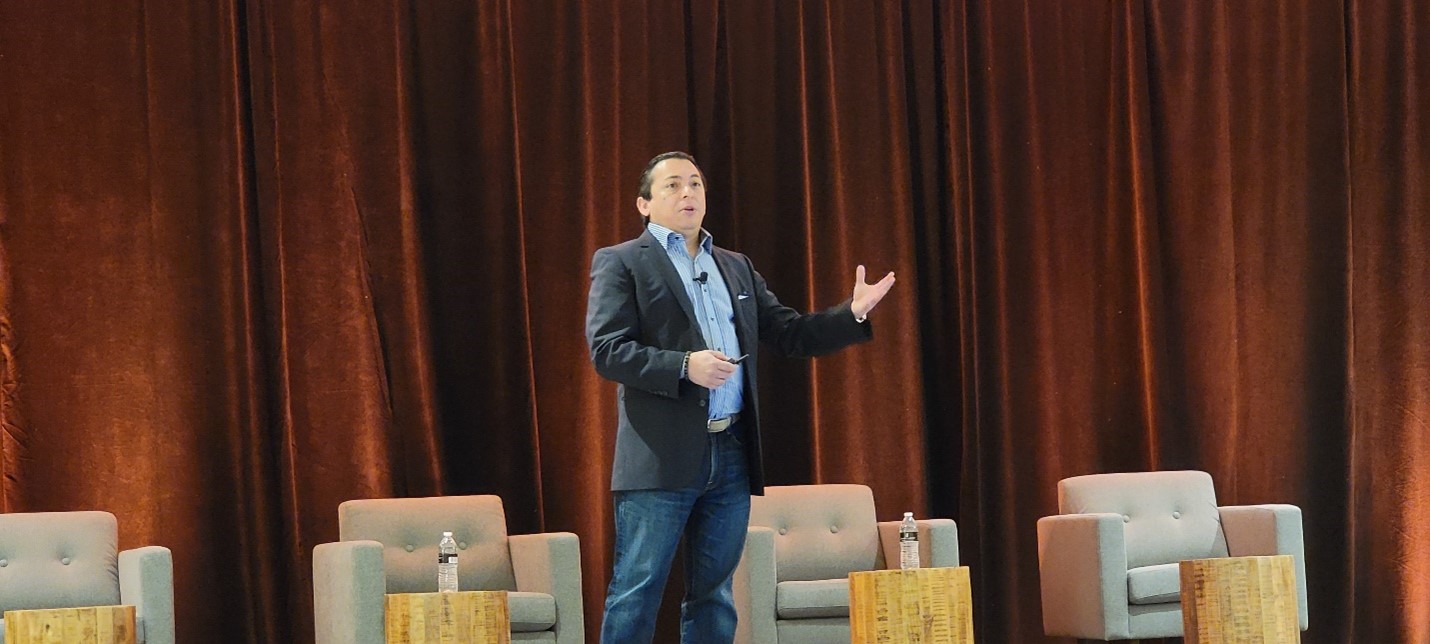At the Marketing Partner Forum, embracing change & seeking reinvention take center stage as ways to strategically adapt to periods of continuing uncertainty
AMELIA ISLAND, Fla. — Amid a still-continuing global pandemic and the economic upheaval it has brought, people need to realize that embracing change and reinvention — rather than a push to “return to normal” — will enable them to navigate the crisis more successfully, according to Brian Solis, a world-renowned author, digital anthropologist, and futurist.
Solis, who gave the keynote talk on Thursday at Thomson Reuters’ 29th annual Marketing Partner Forum, encouraged attendees to embrace change. “These times are anything but a ‘new normal’,” Solis said. “In fact, this isn’t even a race toward normalcy. It is actually a moment to do the opposite.” He implored the audience to change their view and see this era as a time to “reinvent” everything.
Expanding on his vision of embracing change, Solis cited several key factors that law firms or individuals can leverage to ensure success. Not surprisingly, resilience is at the top of his list. How business, organizations, and people addressed the challenges they endured over the previous two years greatly determined whether they were able to earn a degree of success from those efforts.
“These times are anything but a ‘new normal’. In fact, this isn’t even a race toward normalcy. It is actually a moment to do the opposite.”
Solis also cited optimism as another factor in successfully adapting to the change brought by the ongoing crisis. Indeed, optimism is “the only thing you truly need to be innovative,” he said, adding that, admittedly, this quality is in rare supply these days.
After the describing these more aspirational factors, Solis pivoted to focus on a concept he termed Digital Darwinism — situations in which organizations themselves were disrupted when their customers’ expectations and behaviors changed but the company does not adjust or have either resilience or optimism. Entire industries have been and will likely continue to be disrupted as a result, he added. For example, Solis discussed how organizations and entire industries can have their own Kodak Moment — that moment when you realize that customer behaviors and preferences have changed so dramatically from your assumptions that it is too late for you to change.
A few gasps could be heard in the audience at this, which really underscored the ramifications of a moment like that if it were to happen in the legal industry. Solis, quoting MIT’s digital technology visionary Jeanne Ross, said that “leaders must reassess how digital technologies and information can create new customer value. The alternative is to try to succeed in a digital economy with a pre-digital value proposition” — which likely will not work.
Embracing the digital transformation
Solis also warned of some of the pitfalls of so-called innovation traps — change for the sake of change that doesn’t really solve the users’ problem. For example, someone create a chatbot, but is it really solving a customer problem or creating more frustration? Typically, these innovation trap issues arise because of a concept he called “out of touchness” — the gulf between customers’ expectations and what the business is offering.

“We are driven by the pieces that hold us back,” he said. “The idea is simple but powerful.” For instance, company executives think about what they believe to be a solution to a problem; meanwhile, customers are expressing a need, which goes unfulfilled. Speaking to attendees directly, Solis asked them: “Does your C-suite have enough digital smarts”, the kind that goes beyond technology to “empathy”? For law firm leaders specifically, Solis asked, “What if today was 2030? How would your firm look?”
Indeed, the level of savviness needed to survive may well take “an understanding — developed thorough experience and education — of the impact that emerging technologies will have on a business success over the next year,” he explained, adding that sadly, only 23% of large companies have digital savvy executives. This alone creates further divide between the business and its customer.
The pandemic clearly showed that there are two key experiences that every business needs to keep front and center — the customer experience and the employee experience. Indeed, it may have been surprising to some attendees to hear that employee satisfaction and happiness was nearly as important to business success as the customer experience.
Fortunately, innovators are seeking better ways to engage for both the customer and the employee. Solis noted that 61% of people will spend more time online after the pandemic, and 76% of customers want to see integration across marketing, sales, and service, which of course impacts both the customer and the employee. When this integration trifecta is accomplished, both groups are more satisfied.
In his concluding thoughts, Solis pushed people to think of innovation as not limited to technology. “It’s a mindset,” he said. “If you’re waiting for someone to tell you what to do, you’re on the wrong side of innovation.”
As people eventually go back to the office, everyone would do well to focus on three concepts:
-
-
- Iteration — doing the same things as yesterday but better, faster, cheaper;
- Innovation — doing new things;
- Disruption — changing and reinventing the things you can.
-
Despite the difficult task ahead, Solis did offer some of that rate optimism. “When we invest during times of struggles, we win,” he noted. “But stay practical — disrupt the company, not the business model.”
With everything people have endured recently, organizations and firms that embed transformation into their operating model — by paying close attention to integration, innovation, customer experience, and their employees wellness with execution — will perform better.







